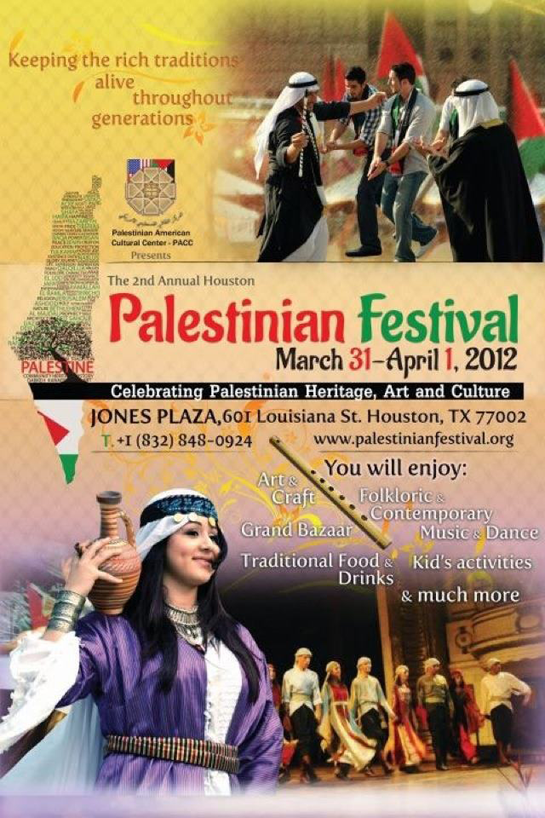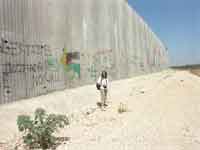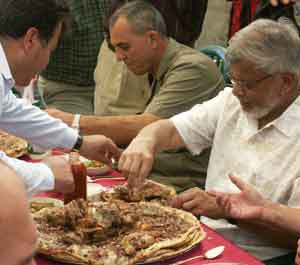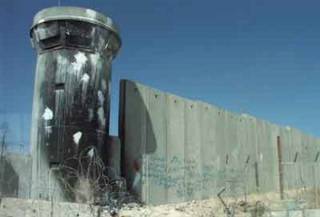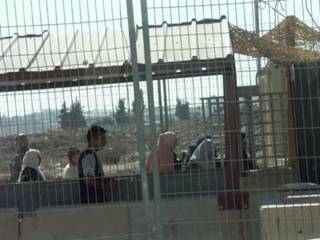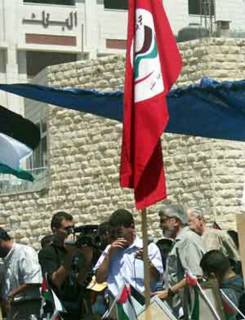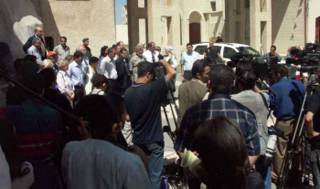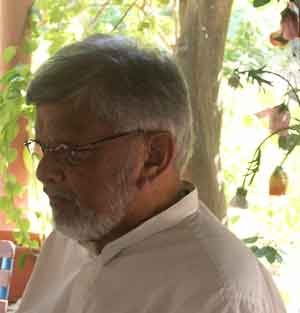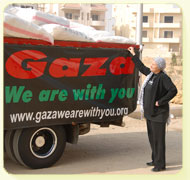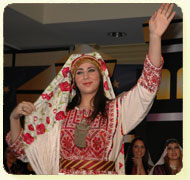|
More News
This article appeared in the Jerusalem Post today: Gandhi visits Yad Vashem
This article also appeared in the Jerusalem Post today: Arun Gandhi: Lessons from my grandfather
This article was published by the Palestine Media Center: Gandhi Urges Palestinians Not to Lose ‘Moral Ground’
This article appeared in Haaretz today: Needed: A great soul
This article appeared August 27 in the Independent (UK): Gandhi Heir Urges Palestinians to Adopt Non-Violence Tactic
Walid Batrawi prepared lists of the press coverage of the Gandhi visit. You can download them in Microsoft Word format from the P4PD site: Arabic Press and English Press.
This article appeared in the Daily Dispatch, Eastern Cape, South Africa: Gandhi grandson condemns wall
This article appeared in the International Herald Tribune: Gandhi's grandson ends visit to W. Bank
- posted by M @ 11:18 AM (1) comments
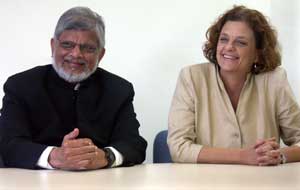
Sunday afternoon Gandhi visited Tel Aviv to meet with the initiators of the Geneva Accord, an unofficial peace plan written in 2003. Here he is shown with Member of the Knesset Yuli Tamir. |
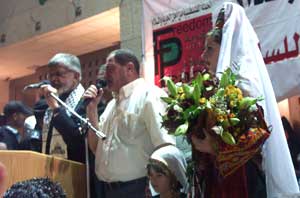
Arun Gandhi addressed a crowd of thousands at a candlelight prayer vigil in Manger Square in Bethlehem Sunday.
|
- posted by M @ 12:00 AM (0) comments
Sunday, August 29, 2004
This column by Susan Ives, one of the companion travelers on the Gandhi tour, appeared in the Sunday Op-Ed section of the San Antonio Express-News Sunday:
Fighting Peacefully in a War-torn Land
JERUSALEM — The dateline may say Jerusalem, but already I've been to Abu Dis, Jericho, Ramallah, Qaquilya, Tulkarem and Jayyous. Today I am in Tel Aviv.
I'm traveling this week with Arun Gandhi, grandson of Mohandas Gandhi, on a tour of Israel and Palestine organized in the United States by San Antonio-based Palestinians for Peace and Democracy and here in the Middle East by a new coalition, the Palestinian Campaign for Freedom and Peace.
Gandhi crossed the Allenby Bridge from Jordan and was greeted outside Jericho at the Monastery of St. Erasmus by about 150 people, mostly farmers from the Jordan Valley on the shores of the Dead Sea.
It couldn't have been a more appropriate place: the grandson of the man who started the salt march that led to India's independence being welcomed to occupied Palestine at the saltiest place on the planet.
The point wasn't missed by the farmers. A young man told me that Palestinian TV has been showing the movie "Gandhi" almost nonstop for the past few weeks in preparation for this historic visit.
The Palestinians understand nonviolent resistance — the two words are always used in tandem here — and have long been practicing it alongside the violent resistance that dominates the front pages of the newspaper.
Nine days before Gandhi's arrival political prisoners held in Israeli jails went on a hunger strike. The entire West Bank joined in. People walk in procession to solidarity tents erected in the center of every Palestinian city after Jum'a prayer on Fridays and after church services on Sunday. On Monday, the children of the 7,500 fasting prisoners walked in procession; the next day Palestinians involved with the legal system donned their robes, marched and fasted. Our group fasted on Friday.
There are nonviolent drives here to boycott goods made in the Israeli settlements in the West Bank and the Gaza Strip. There are campaigns encouraging workers to refuse to work on construction of the wall that is snaking its way through the West Bank.
In the 1980s Palestinian activist Mubarak Awad developed a list of 160 creative ways that his countrymen and -women could resist the occupation. Refuse to open official letters written in Hebrew. Show up for work on Israeli holidays. Refuse to pay taxes for services you are not receiving.
For the first few days of my visit I stayed with Terry Boullata in Abu Dis. "Where do you take your trash?" I asked, a curious housewife wondering about the mechanics of daily life.
The next morning, a municipal trash truck stopped by the army outpost that looms outside her kitchen window to collect their garbage. The truck stopped by the homes of the three Israeli settler families that had moved into the neighborhood a few months ago. They didn't pick up any trash from the 13 Palestinian families living in the area, not one pita crust or mango peel.
Some days she feels bold and slips her small bag of trash into the army's dumpster. Most days it goes into the trunk of her car, and she looks for a safe and legal place to drop it.
She pays the highest property tax rate in Israel, she says, and drives around with her trunk full of garbage because the city will not pick up a Palestinian taxpayer's trash. That stinks.
In Jericho, Gandhi recalled that as an Indian boy growing up in South Africa, he was beat up by both whites and blacks. He was consumed with rage, and at 12 was sent to India to learn how to control his anger from the expert, his grandfather.
Anger is like electricity, his grandfather said. Uncontrolled it can burn down a house. When properly harnessed, it can light a city. Learn to control your anger and you can be a light to the world.
César Chávez said that the first principle of nonviolence is to say no to everything that is humiliating. Carrying garbage in the trunk of your car is perhaps a small humiliation, but the daily stripping away of your dignity fosters a deep anger.
The Palestinians will continue to be angry; it would be inhuman not to be so. We can but hope that Gandhi's visit will electrify this anger with a current of nonviolence. It could power a revolution.
- posted by M @ 3:00 AM (0) comments
Friday, August 27, 2004
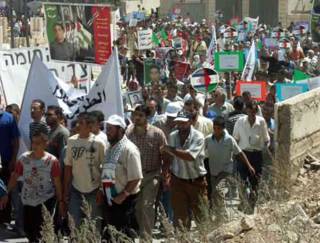
Thousands of Israelis and Palestinians attended the rally in Abu Dis today.
|
ABU DIS
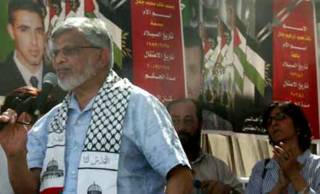
Arun Gandhi gave a speech to thousands at the Abu Dis rally. |
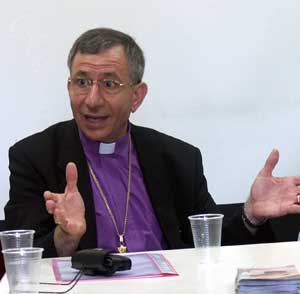
Palestinian Prime Minister Ahmed Qureia (Abu Ala) gives the peace sign to Gandhi and members of his delegation at a meeting in his Abu Dis office prior to the rally. |
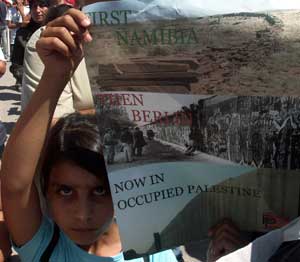
A young Palestinian girl holds up one of the posters advertising the week's event at the rally in Abu Dis
|
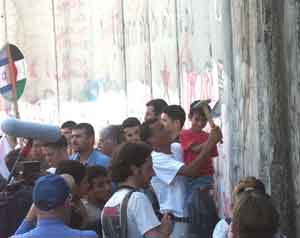
After the rally, people were invited to symbolically hit a hammer against the wall.
|
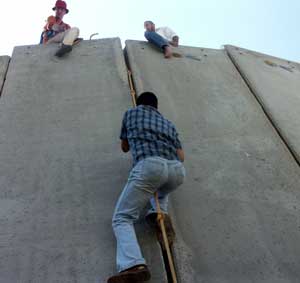
Pete (top left), an American from Alaska gives wall climbing lessons on the 8-meter-high wall in Abu Dis during the rally there.
|
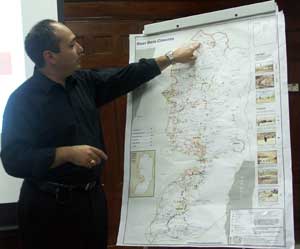
Dr. Tawfiq Nasser, Director of the Lutheran World Federation's Augusta Victoria Hospital on the Mount of Olives, briefed Gandhi and the delegation on problems of medical access caused by the occupation and gave a tour of the hospital. |

The Rt. Rev. Dr. Munib A. Younan, Bishop of the Evangelical Lutheran Church in Jordan, spoke to Gandhi and the delegation at Augusta Victoria hospital and offered a blessing for the success of the mission.
|
|
|
|
|
- posted by M @ 6:06 PM (0) comments
Thursday, August 26, 2004
Wednesday, August 25, 2004
REFLECTION
August 25, 2004
This reflection for the trip was provided by Laura:
When Elijah fled from the wrath of Jezebel, he found himself in a cave in the mountainside. The Word of God came to him in that place and said, "Elijah, what are you doing here?"
It is still a good question from our God.
"What are you doing here?"
We have visited Holy sites of three of the world's great religions today - amazing because they are within walking distance of one another in the Holy City of Jerusalem.
And we have heard the stories of people whose lives are broken and disrupted, at best, as they deal with the reality of living in the occupied and now Israel developed West Bank.
And our God asks us still, "What are you doing here?"
What difference will it make that Gandhi visits the Holy Land?
What difference will it make if any of us do?
It all depends on how we answer the question our God continues to ask, "What are you doing here?"
The question is not: "What business do you have here?" nor "Who gave you the right to be here?" but "What are you doing here?"
Our God asks: What are you doing with this life I have given you?
What are you doing with the power I have give you?
Are you loving my children? All of them? Even the ones you don't like?
It is rather easy to walk these streets - to walk from holy site to holy site. It doesn't take much.
But it takes courage to walk the distance from your life to the life of an other. It takes courage to take time to listen and understand.
It takes courage to live a whole life in answer to God's question, "What are you doing here?"
- posted by M @ 5:01 PM (0) comments
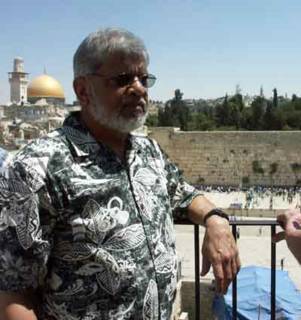 |
Today Arun Gandhi had breakfast with members of the Palestinian Legislative Council and civil society. He then toured the old city of Jerusalem: in the background of the photograph to the left is the Dome of the Rock and the Western Wall. He also met with representitives of the Waqf, the Latin Patriarch, Michael Sabbah, and visited with prisoner families who are supporting the prisoners hunger strike. Below: visiting the AlHaram Sharif and breakfast with Palestinian leaders. |
 |
 |
|
|
- posted by M @ 10:53 AM (0) comments
Tuesday, August 24, 2004
Gandhi Tour of Palestine & Israel
The India Express Bureau published this article today: ‘Arun Gandhi's initiatives an education in non-violence’
The Times of Oman reported on Gandhi's proposed fast in this article: Israel declares hospitals off limits for Palestinians on hunger strike
The Gulf Daily News (Bahrain) reported on the Gandhi visit in this article today: Israel plans 530 West Bank homes
An opinion piece by Arun Gandhi ran in the Daily Star (Lebanon) today: The true meaning of nonviolence in the Palestinian-Israeli conflict
- posted by M @ 6:17 PM (1) comments
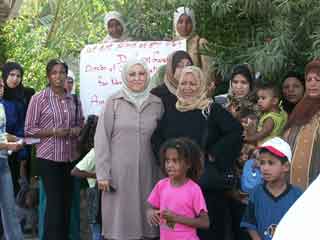 |
Arun Gandhi crossed the Allenby Bridge from Jordan on Tuesday, August 24 and was greeted by a delegation of farm families from the Jordan Valley. Here a group of women and children await his arrival at the Monastery of St. Erasmus, near Jericho. |
- posted by M @ 5:25 PM (0) comments
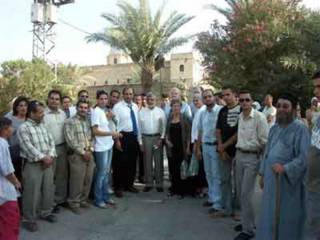 |
Many people greeted Arun Gandhi as he set foot upon Palestinian soil for the first time. He told the group that his grandfather had always wanted to visit Palestine but it took more than six decades for his grandson to make the trip in his place. |
- posted by M @ 5:25 PM (0) comments
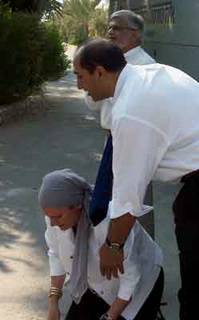 |
Sahar, a member of the Gandhi companion tour, is a Palestinian woman from Houston who has never before been to Palestine. She was so overcome by her first visit to her homeland that she knelt to kiss the ground upon her arrival. Mohammed Alatar, president of Palestinians for Peace and Democracy, is helping her rise, and Arun Gandhi is in the background. |
- posted by M @ 5:20 PM (0) comments
Monday, August 23, 2004
PRESS RELEASE for local media
In Solidarity with Palestinian Prisoners
Against the Occupation and the Wall
For Freedom and Peace
Join massive rallies with the participation of Dr. Arun Gandhi
At the time when the Israeli occupation is escalating its oppression against our prisoners, and at the time when occupation forces continue its daily aggression by planning to expand Israeli settlements and by continuing to build the racist occupation Wall, the Palestinian people insist on resisting occupation and struggle to gain our legitimate rights and will continue to organize non-violent public campaigns in solidarity with prisoners in Israeli prisons, to resist the building of the Wall, resist the expansion of settlements and resist the occupation.
On a daily basis, our people gain more victories and supporters from all over the world who are shocked by the daily crimes of the Israeli occupation. Our supporters deeply believe in our just cause derived from the principles of justice and equality. Our supporters organize solidarity campaigns everywhere, to show the suffering of Palestinians for all the world. They take part in demonstrations against the Wall, they demonstrate in front of Israeli checkpoints, and they boycott Israeli goods.
The visit of Dr. Arun Gandhi, the grandson of the Liberator of India, comes to voice the Palestinian cry for peace and freedom to the international community
Gandhi’s visit to Palestine, accompanied by a delegation of political and religious figures is yet another proof of the legitimacy of our struggle. Their participation in massive rallies in Ramallah , Abu Dis and Bethlehem, their visit to the our besieged President and their solidarity with our prisoners, open the road to expand solidarity movements with our people, put pressure on the Israeli government to implement the ruling of the International Court of Justice regarding the racist occupation Wall and is also a call to implement the Fourth Geneva Convention.
We call upon you to participate in the massive rally that will take place on August 26 at 12:00 in Friends Soccer Field, Al-Bireh, the rally in Abi Dis taking place on August 27 (Abu Dis-Azariya junction) after the Friday prayers and the candlelight vigil in Bethlehem on August 29 at 8:00 pm in the Manger Square.
The Palestinian Campaign for Freedom and Peace
August 24, 2004
- posted by M @ 10:44 AM (0) comments
UPDATED SCHEDULE:
Tuesday, August 24:
Dr. Gandhi & party will cross the Allenby Bridge from Jordan and be received in Jericho by a delegation of farmers who have been affected by the wall.
Wednesday, August 25:
9:00 am: Breakfast with PLC members and Palestinian civil society members.
10:00: Tour of the Old City of Jerusalem
1:00: Tour of AlHaram Sharif followed by lunch with Waqf representatives
4:30 pm: meeting with Patriarch Michael Sabbah
7:00-9:00pm: By-invitation only discussion on "The Thesis of Nonviolence and the Strategies of Resistance" followed by a reception at the Ambassador Hotel, for invited Palestinian/Israeli peacemakers, activists, politicians and diplomats.
Thursday, August 26:
10:00: Meet with President Arafat and press briefing
11:00: Palestinian Peace Rally in Ramallah
12 noon: visit to Am'ari Refugee Camp
3:00-4:00 pm: By-invitation reception at the Canadian Representative office followed by a film showing at the Qassabeh Theater.
7:00 pm: Panel discussion at the Van Leer Institute in Jerusalem. Open to the public.
Fri day, August 27:
Arun Gandhi will be fasting today in solidarity with Palestinian political prisoners
9:00 am: Visit to Augusta Victoria Hospital
12 nooon-1:00 pm: Meeting with the Palestinian Prime Minister in Abu Dis
1:00 - 2:00 pm: Palestinian-Israeli peace rally in Abu Dis
Saturday, 28 August
All day: Tour of the Wall in Tulkarem, Qalqilya and Jayyous, meet with farmers affected by the Wall.
Sunday, August 29:
Afternoon: meetings in Tel Aviv with the Steering Committee of the Geneva Initiative and other NGOs and meetings with Israeli media.
7:00 pm: Candelight vigil in Manger Square, Bethlehem, with leaders from the three major faith traditions.
Monday, August 30:
9:00 am: Press conference
Afternoon: return to Jordan for flight back to United States
- posted by M @ 5:24 AM (0) comments
MEDIA ADVISORIES
There will be a press conference at the conclusion of Arun Gandhi's tour, 9:00am on Monday, August 30, 2004 at the Ambassador Hotel in Sheikh Jarrah, Jerusalem. For more information, or for other media inquiries, contact Mr. Walid Batrawi, 972-59-649721.
Dr. Gandhi will be speaking at a by-invitation only event at the Ambassador Hotel in Jerusalem, on Wednesday, 25 August, 2004 from 7:00-9:00 pm. The topic is "The Thesis of Nonviolence and the Strategies of Resistance." Other participants in the panel discussion include Mohammed Alatar, Hanna Amira and Dr. Shalomit Aloni. Media who wish to cover this discussion should contact Mr. Walid Batrawi, 972-59-649721.
- posted by M @ 5:08 AM (0) comments
Thursday, August 19, 2004
Wednesday, August 18, 2004
Tuesday, August 17, 2004
Mohandas Gandhi on Israel/Palestine
Mohandas Gandhi's writings about Israel and Palestine have been controversial. You can read his most significant article, written in 1938, here: The Jews in Palestine. A long list of online articles about Gandhi and Israel/Palestine is available on the P4PD Web site.
- posted by M @ 3:52 PM (0) comments
Monday, August 16, 2004
P R E S S R E L E A S E
Regarding my visit to the Middle East, let me affirm the following:
Upon an invitation from Palestinians for Peace and Democracy, an organization that believes in a just peace for the Palestinian people, I am on an independent peace mission to help all parties stop the bloodshed in the Holy Land. No one can deny the Palestinians’ right to their freedom and to resist occupation. No one can deny the Israelis’ right to their own state and to security.
What my grandfather said in 1938 is still true today, “According to the accepted canons of right and wrong, nothing can be said against the Arab resistance in the face of overwhelming odds.”
Nonviolence works. Nonviolence worked in liberating India from the British Occupation. Nonviolence worked for the African Americans in claiming their civil rights. Nonviolence worked for the South Africans in winning their freedom from Apartheid. Nonviolence will work in the Holy Land. In fact, nonviolence is the only solution to breaking this cycle of violence. Violence fought back with violence only creates more violence. The only way to peace is peace. This is not passivity. The nonviolence that is needed in the Holy Land is active, courageous, and creative that will resist the humiliation of the Palestinians or any peoples, that believes in the human dignity for all peoples. Nonviolence will work for the Palestinian people. It is their choice. There is no amount of walls and fences that can keep a people from their freedom.
Arun Gandhi, Grandson of Mahatma Gandhi, August 16, 2004
- posted by M @ 11:04 AM (0) comments
Sunday, August 15, 2004
An open invitation to a panel discussion (in English):
Can Non-Violent Strategies Lead to Peace
between Palestinians and Israelis?
Chairperson: Dr. Shimshon Zelniker, Head, The Van Leer Jerusalem Institute
Opening Remarks:Walid Salem, Director, Jerusalem office Panorama Center for the Dissemination of Democracy and Community Development
Participants: Arun Gandhi, President, M.K. Gandhi Institute for Non-Violence; Dr. Ivy Sichel, Hebrew University and Hacampus-lo-shoteq; Lucy Nusseibeh, Director, Middle East Non-Violence and Democracy
Screening of excerpts from the documentary film: Non-Violent Resistance in Bidu and Beit Laqiya, Spring 2004, by Shai Carmeli
Thursday, August 26, 2004, 19:00, at the Van Leer Jerusalem Institute, 43 Jabotinsky Street, Jerusalem, Tel. 02-5605222 / www.vanleer.org.il
- posted by M @ 8:44 AM (0) comments
Saturday, August 14, 2004
Wednesday, August 11, 2004
The official U.S. delegation consists of:
- Mohammed Alatar, director of Palestinians for Peace & Democracy
- Douglas Dicks, a representative from the Presbyterian Church (USA)
- Arun Gandhi, grandson of M.K. Gandhi
- Ann Helmke, director of the San Antonio peaceCENTER
- David Link, director for the International Centre for the Healing and the Law
- posted by M @ 9:04 AM (0) comments Monday, August 09, 2004
On Monday, August 9, 2004 the following press release was issued. Note:the dates and events are subject to change, and some planned events are not yet listed, pending final confirmation of the details.
P R E S S - - - R E L E A S E
Palestinians for Peace and Democracy ( www.p4pd.org) announces a nonviolence campaign and peace delegation to the Holy Land, August 23-30, 2004.
Arun Gandhi, grandson of Mahatma Gandhi, will be part of the peace delegation to Jordan, Palestine, and Israel. He will be speaking and carrying the nonviolent legacy of his grandfather to this troubled land to inspire millions of people in the Holy Land to adopt nonviolent methods in their struggle and conflict.
Major events during the campaign tour:
23 August: Fundraising dinner in Jordan to raise monies and re-plant razed olive trees
24 August: Visit to the largest refugee camp in the world
26 August: The main event -- massive peace rally in Ramallah
27 August: Israeli & Palestinian peace rally in Abu Dis to resist the Wall
28 August: To be determined
29 August: Inter-faith candlelight vigil with Christians, Muslims, and Jews at the Church of the Nativity in Bethlehem
30 August: Visit to Yad Vashem
Dr. Arun Gandhi, founding director of the M. K. Gandhi Institute for Nonviolence, is the grandson of Mahatma and is committed to carrying on that great legacy. Arun travels and speaks, nationally and internationally, inspiring this nonviolent legacy within the given context and climate. Dr. Gandhi also has his own legacy of nonviolent training development and community organizing. His latest book is " Legacy of Love."
Palestinians for Peace and Democracy, San Antonio, Texas, is a non-profit organization and grassroots movement of Palestinians in the U.S. and in Palestine. It is dedicated to the promotion of peace and justice for the Palestinian People and the use of peaceful resistance to the occupation of Palestine -- its land and its people.
FOR MORE INFORMATION ABOUT THE CAMPAIGN TOUR, CONTACT:
Palestinians for Peace and Democracy
210.389.4890 until August 20
011972544411921 after August 20
During the actual tour a daily report can be found at: www.p4pd.org/blogger.html
- posted by M @ 9:29 AM (0) comments
New features!
We have added two new features to the Gandhi Visit blog:
- This blog is now available as a syndicated news feed. The URL is www.p4pd.org/atom.xml and it is in the Atom XML format.
- We have added the capability for anyone to add comments to this blog. To add your own comment, click on the word "comments" at the end of any post. Comments will be reviewed frequently and any that are not in the spirit of Gandhian nonviolence will be edited or deleted.
- posted by M @ 8:55 AM (0) comments
Saturday, August 07, 2004
On Sunday, August 8, 2004 a quarter page ad announcing the Gandhi Tour will run in the San Antonio Express-News. (You will need Adobe Acrobat reader to view the ad, which is in PDF format. If you do not have that free program installed, you can download it here. The ad is 519k.)
- posted by M @ 8:50 AM (0) comments Wednesday, August 04, 2004
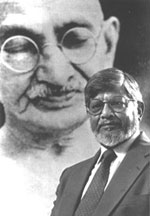 about ARUN GANDHI
about ARUN GANDHI
Born in 1934 in Durban, South Africa, Arun Gandhi is the fifth grandson of Mohandas Karamchand "Mahatma" Gandhi. Growing up under South Africa's apartheid for someone of Eastern heritage was difficult, humiliating, and often dangerous. Hoping that time with his grandfather would help the twelve-year-old Arun control his rage and deal with prejudice through nonviolent means, his parents took him to India to live with The Mahatma" (or "great soul") in 1946.
Arun's stay with his grandfather coincided with the most tumultuous period in India's struggle to free itself from British rule. His grandfather showed Arun firsthand the effects of a national campaign for liberation carried out through both violent and nonviolent means. For eighteen months, while Gandhi imparted lessons to his grandson, the young man was also witnessing world history unfold before his eyes: this combination set Arun on a course for life.
His journey was strengthened by the resolve of his parents Sushila and Manilal, Gandhi's second son, to raise their children according to the principles of nonviolence. Arun's father, Manilal, spent more than fourteen years in prison for his efforts to change South African apartheid nonviolently. Arun's mother, Sushila, spent fifty-four years at Gandhi's ashram, Phoenix, outside Durban.
At twenty-three Arun returned to India and worked as journalist and reporter for The Times of India. He, his wife Sunanda, and several colleagues started the successful economic initiative, India's Center for Social unity, whose mission is to alleviate poverty and caste discrimination. The Center's success has now spread to over 300 villages, improving the lives of more than 500,000 rural Indians.
Arun and Sunanda came to the United States in 1987 to compare race issues in the American South, color discrimination in South Africa, and the caste system in India. In October of 1991 the Gandhis founded the M. K. Gandhi Institute for Nonviolence. Its mission is to examine, promote, and apply the principles of nonviolence thought and action through research, workshops, seminars, and community service
This reflection was written by Ann Helmke, one of the delegates on the tour:
Climbing a Wall
Gandhi walked to the sea.
Rosa Parks sat down on a bus.
Pete, from Alaska, climbed a wall.
Looking at any one of these in their most basic sense, well, they don’t sound like much. One walked. One sat. One climbed. Three simple human acts. That doesn’t mean that any of these acts were easy. Try walking 241 miles with only a stick in your hand and a pair of sandals on your feet. Try sitting down anywhere where you know you’re not wanted, the surroundings are hostile, and your feet are dead tired from working all day. Or, try doing what Pete did…
He climbed a 25-foot concrete wall by only using his feet and hands along a seam. In itself that was difficult enough, but he also knew that he could be shot at any moment. And he did it in front of an audience of 5000-8000 people.
There we were, the Peace Delegation and Arun Gandhi, in the midst of the largest Palestinian and Israeli peace rally ever, in the middle of Abu Dis, in the exact place where Jesus walked and visited with friends.
The sun was hot. The crowd was filled with energy. There were banners everywhere – “Freedom is our birthright,” “No to Occupation. Yes to Freedom. Yes to Peace.,” “Peace is our birthright.” There were round placards where the Israeli flag and the Palestinian flag were part of one design. The backdrop for the stage was that concrete wall. Cameras and media from all over the world swarmed the crowd. Young and old were smiling and singing. You couldn’t tell who was Palestinian and who was Israeli. The people were ecstatic to be there. They were geared up with the thought of nonviolence and the longed-for day of peace.
A poet read. A Muslim spoke. A Jew spoke. A Christian spoke. They all joined hands together and raised them to the sky in a gesture of unity and peace. Then Arun went to the microphone to speak. He spoke words of nonviolence and the simple yet courageous human acts that are needed to make peace concrete. While he was speaking, the eyes of the crowd and the murmur of their voices began to rise upward. Everyone’s eyes were slowly, with awe and trepidation, following Pete as he began to scale the wall behind the stage. Carefully he would place one hand, one foot after the other in the middle of a seam that went straight up to the top. There probably weren’t too many other people in the crowd who even knew how to do this, let alone the courage, because this is no ordinary wall on the side of a building or between two neighbors’ yards.
The wall that Pete was climbing is being built on Palestinian land by the Israeli government. Its spoken intent is to separate these two neighboring peoples and provide security to the Israelis. The only people it truly separates are neighboring Palestinians, family from family, hospitals from the sick, children from their schools, farmers from their land, the dead from their cemeteries. The wall also only seems to heighten the animosity and anger instead of increasing security.
I know. I’ve seen it with my own eyes. I’ve listened to the stories firsthand from the two neighboring peoples. It causes me great despair to see people in such oppressive pain. It causes me great shame to realize how little we know of this in the U.S. and how we’re so entangled in this nightmare politically, religiously, financially. This structure is called by many names. For me, it is the epitome of despair and shame.
I marveled at Pete as he climbed that wall – his dexterity, his sense of freedom, his embodied knowledge of nonviolence. Pete knew exactly what he was doing, just as much as Gandhi knew, just as much as Rosa Parks knew.
In his climb he was making the statement that nonviolence is made up of simple human acts, nonviolence is active and not passive. In his climb he was making the statement that even though walls, metaphorically and physically, are built between peoples there are many ways to overcome them – through them, around them, over them, or simply tear them down. In his climb he was making the statement that even though there are sometimes such great obstacles to peace, so much so that one thinks they have no choice in the matter, a person still has choice.
Pete knew the creative ingenuity of the means meeting the end. He knew that the nonviolent action in regards to this wall needed to be more than staring at it, or complaining about it, or protesting it, or accepting it as total humiliation. I have never seen such a free and liberated and passionate man in my life. And it was contagious. With each foot he traveled, with each cheer that went up from the crowd, people were being filled with the sense of their own freedom and liberation, their own passion and potential choice for peace.
But Pete knew one other important thing about nonviolence. He knew that it wasn’t just about him. It’s larger than that and it’s available to everyone. When he got to the top of that wall he secured a couple knotted ropes down the side to others waiting on the ground. His great act of courage inspired the hearts of those of us below. One by one others began to climb up those ropes to the top of the wall, and when they reached the top they all, we all, became one in solidarity with that freedom and potential peace.
Through my tears I began to imagine Israelis on the other side of the wall climbing up to meet them. It was a beautiful sight in my mind, but as I stood on the stage and turned from the wall to look out across the crowd, I realized that some of the Israelis had already made it. United on the stage and in the crowd were Israelis and Palestinians.
We shouldn’t have to imagine peace but if that’s where we need to begin, so be it. Better yet, why not look at those who are already about nonviolence? Why not support them? Why not become one of them? I don’t know, maybe I’m naïve, but many think Jesus was naïve, as well as Gandhi and Rosa and Pete. Frankly, it makes me no difference what other people think. History informs me. They chose peace, and changed the world.
Sunday, September 19, 2004
This reflection was written by Jerry Crane, one of the delegates on the Gandi tour.
The Palestinian Farmer
Saturday (August 28, 2004) we drove to Qalqilya and toured the area and the farms and saw the effects of the wall on the farmers and the community.
I talked with Omar. He grows 11 kinds of citrus trees, he has olive trees and also raises vegetable crops. The wall has separated him from his fields. He does have a permit to go thrugh gate 25, but it is much farther for him to go to get to his fields that way. The gate doesn't open early enough and it closes too early, which means by the time he has has to wait to get through the gate the days are too short and they have to work in the heat of the day.
In the peak seasons he needs a lot of workers and it is very difficult to get them through the gate and it also hard to get workers to work only in the heat of the day. Sometimes Omar and his wife have stayed and worked in the night, but it is illegal and he could be fined or even jailed.
How can a farmer operate this way, I asked myself. I am a farmer in America, in Illinois, and I can't imagine the pressure that these circumstances put on him and his wife.
The farmer is a survivor. Omar tries hard to keep his attitude good and his mind sharp. Can he make it? I don't see how, but in my innermost self, because of who he is and what he is, I guess somehow I believe he will.
But even if he does survive, is it right to punish him with so much pressure and difficulty? His workers told him they would work for a percentage of the crop, but they cannot sell it because of the wall, so Omar has to buy it back from them but then can he sell it? I don't know, but I do know that it will push this man to the maximum of his abilities, both his physical strength and his soul.
Some say the wall isn't violent. I believe it is one of the most violent things they could do to the farmer. Also, I noticed on our way to see the wall along the streets we traveled there were many shops where the farmers used to shop and now they are all closed up. Where did the shopkeepers go and what is the future?
During our visit the people in the area cooked a big dinner for us, chicken and all we could eat and drink. They were very hospitable and friendly. Is this the sign of a violent people - I don't think so. We talked much of non-violence - everyone is afraid and fears for their safety and their freedom, both Israeli and Palestinian.
I believe there are two basic emotions in life - fear and love. Everything comes from these two. If someone is angry with you and hates you and tries to destroy you it is because they are afraid. Can't we somehow practice love towards each other? Dr. Gandhi says if we could trade places with each other for 2 months then we would understand and be ready to love each other instead of hating each other. Is that too much to ask?
- posted by M @ 3:33 AM (2) comments
Saturday, September 18, 2004
This reflection was written by Sahar Abusadra, one of the companions on the Gandhi tour:
Confusion
Since I came back last Thursday, September 9th, I am trying to blend with my real world, but with no luck. I don't think I can blend any more. My life has changed since I saw Jerusalem with my own eyes. I cannot see anything else.
At the end of my trip I went to onto Cairo, then to Athens, and then To Amsterdam. But it is as if everything is fake. No where and no city is good for me any more. Plus I feel now more than ever that I am very proud to be Palestinian. I am very proud of my people and their resilience.
But tonight I started to get my self back together, just to see if I could explain my feelings while I was there in our beautiful and holy Palestine.To tell the truth, I got really confused, whether to be angry or not. Mr. Gandhi was asking us not to get angry or to perform any violence. And the Israelis are asking us the same thing. But how?!!
Story after story after story, and after all of these years being away from my homeland, what did I come back to see?! I came back to see prisoners being taken way from their families. I came back to see the sight of peoples' homes that were demolished. I came back to the check points with people dying under the sun. I came back to farmers losing there farms. I came back to see the Palestinian children lacking one of the most fundamental human rights -- their right to education. I came back to watch the whole nation under siege.
And I don't know how to describe this, but I was unable to visit the home town of my parents and my grandparents, Gaza. I guess I will have to wait a little bit longer before I get the chance to compare my mother's and my father's stories about Gaza and the beaches of Gaza.
In the beginning I was trying to get use to the idea of being with the Israelis on the same street, eating with them in the same restaurants, and riding in cabs with Israeli drivers. Maybe I'd get used to it if I stayed in Jerusalem, maybe.
I did not lose a father or a mother or a child in this Conflict. I was sheltered from most of it. And now I don't know how these mothers, the ones who kept flashing the pictures of their loved ones in my face, exactly feel. I never walked in their shoes. Maybe I would hate the ones who did this to my child, or maybe not. I don't know.
Have I said I'm confused?
If you would have asked me before my trip if I would be able to live with the Israelis in the same city, I would have definitely answered NO. If you were to ask me now the same question after my visit, I would probably say YES. After all I saw, I would answer YES?!
I guess I'm really confused, or maybe peace is sneaking up on me.
PEACE.
- posted by M @ 3:38 AM (0) comments
Monday, September 06, 2004
Saturday, September 04, 2004
This reflection was offered by Kara, one of the companion travelers on the Gandhi tour, about the checkpoint on Sunday, August 29:
The Bethlehem Checkpoint
Last night, on the way to Bethlehem, we had our first "real" checkpoint experience. I want to make it clear that we've been through many checkpoints but due to the priviledge of being with important people--and more accurately--important American people, we were able to cross with little to no difficulty. Last night, however, was different.
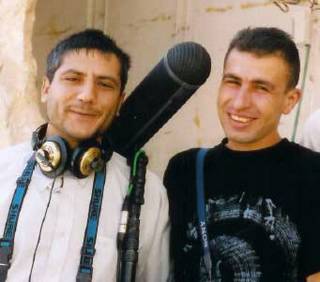 |
It wasn't difficult for "us" as Americans but for our friends, Radwon and Numan, our Palestinian camera men. All throughout the week they had the ease of riding with us--allowed through because of who they were with. They are both former university students who were majoring in T.V./media/music. Due to hard economic times generated from the Wall, their University classes have been cancelled and now they are trying some freelance work. |
Over the past week we've spent 8-10 hours/day with them and have gotten to know them very well--we've shared meals, sang songs, shared stories about our children (and how they control our lives!) and laughed until our stomachs hurt. These are things friends do. And it was so hard to see my friends humilated and intimidated because of who they were--actually it's because of who they are PERCEIVED to be.
It's so ironic that the birthplace of Jesus is off-limits to certain populations--it's called area "A" which means Israelis can't go there. Radwon is Palestinian but was born in an Israeli town and therefore has an Israeli passport and is forbidden to go to Bethlehem. If caught, he would have to pay a $5,000 fine. Numan, who's also Palestinian, was allowed in (by special permit to pass through Israel) but wan't allowed back out the way we came in...because we were going back through Israel. Anyway, this is all so confusing and intentionally crazy-making.
So, we stopped and a young woman with a very large machine gun comes on our bus and asks for our passports. She doesn't smile. She looks at our passports and returns them but takes a long look at theirs and makes a face of disgust; she's clearly not happy. She asks them to go with her. People are very concerned and one of our American delegates goes along. They concluded that Radwan is not allowed to enter and Numan was told he could enter but he could not come back out of the checkpoint. They both had special passes that was to allow them access to these areas but the soldiers decided to override these permits. I was told the randomness is what'll drive you mad....
So we entered the city without our friend and were given a private tour of the Church of the Nativity. The beauty of the church was breathtaking; a special lighted tour just for us--with a full moon overhead and a cool breeze--can you imagine it? It's the place where Jesus was born.
After our tour, we climbed back on our airconditioned bus and headed to the checkpoint. Numan said to me, "I'm very worried about passing". He then dialed his mother on his cellphone--these have become their lifeline. We approached the checkpoint and were stopped and I thanked God the same woman was not there. A large young man with his machine gun walked down the isle inspecting our passports; all was silent. We aren't to say a word. He stops at Numan, the only one with a Palestinian ID card and starts asking him questions. Numan is humble, nervous and tries to smile. Whatever is said seems to satisfy (I think it's our presence) and the soldier starts to walk away but then stops and asks Numan another question. Numan quickly gets his camera equipment and opens the bag. Quick inspection and he's done. He leaves and we all take a deep breath. He tells me that if we weren't with him, he might've been beaten. We found Radwon waiting for us at our hotel; he had waited an hour for a cab and during his wait was taunted by the soldiers, "Go stand there" "No, move over there" "Didn't you hear me?"
There are about 60 such checkpoints in the occupied West Bank. The West Bank is about the size of Bexar County. And there are over 600 other types of closures--partial checkpoints, roadblocks, earth mounds, earth walls, trenches. There are 44 observations towers that house soldiers with guns.
Can you imagine it?
- posted by M @ 8:28 AM (0) comments
Monday, August 30, 2004
|






